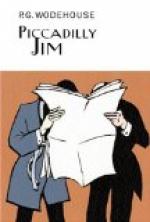Mrs. Pett returned to the present. The past could look after itself. The present demanded surgery.
“One would have thought it would have been obvious even to Eugenia that a boy of twenty-one needed regular work.”
Mr. Pett was glad to come out of his shell here. He was the Apostle of Work, and this sentiment pleased him.
“That’s right,” he said. “Every boy ought to have work.”
“Look at this young Crocker’s record since he went to live in London. He is always doing something to make himself notorious. There was that breach-of-promise case, and that fight at the political meeting, and his escapades at Monte Carlo, and—and everything. And he must be drinking himself to death. I think Eugenia’s insane. She seems to have no influence over him at all.”
Mr. Pett moaned sympathetically.
“And now the papers have found out that I am his aunt, and I suppose they will print my photograph whenever they publish an article about him.”
She ceased and sat rigid with just wrath. Mr. Pett, who always felt his responsibilities as chorus keenly during these wifely monologues, surmised that a remark from him was indicated.
“It’s tough,” he said.
Mrs. Pett turned on him like a wounded tigress.
“What is the use of saying that? It’s no use saying anything.”
“No, no,” said Mr. Pett, prudently refraining from pointing out that she had already said a good deal.
“You must do something.”
Ann entered the conversation for the first time. She was not very fond of her aunt, and liked her least when she was bullying Mr. Pett. There was something in Mrs. Pett’s character with which the imperiousness which lay beneath Ann’s cheerful attitude towards the world was ever at war.
“What can uncle Peter possibly do?” she inquired.
“Why, get the boy back to America and make him work. It’s the only possible thing.”
“But is it possible?”
“Of course it is.”
“Assuming that Jimmy Crocker would accept an invitation to come over to America, what sort of work could he do here? He couldn’t get his place on the Chronicle back again after dropping out for all these years and making a public pest of himself all that while. And outside of newspaper work what is he fit for?”
“My dear child, don’t make difficulties.”
“I’m not. These are ready-made.”
Mr. Pett interposed. He was always nervously apprehensive of a clash between these two. Ann had red hair and the nature which generally goes with red hair. She was impulsive and quick of tongue, and—as he remembered her father had always been—a little too ready for combat. She was usually as quickly remorseful as she was quickly pugnacious, like most persons of her colour. Her offer to type the story which now lay on her desk had been the amende honourable following on just such a scene with her aunt as this promised to be. Mr. Pett had no wish to see the truce thus consummated broken almost before it had had time to operate.




